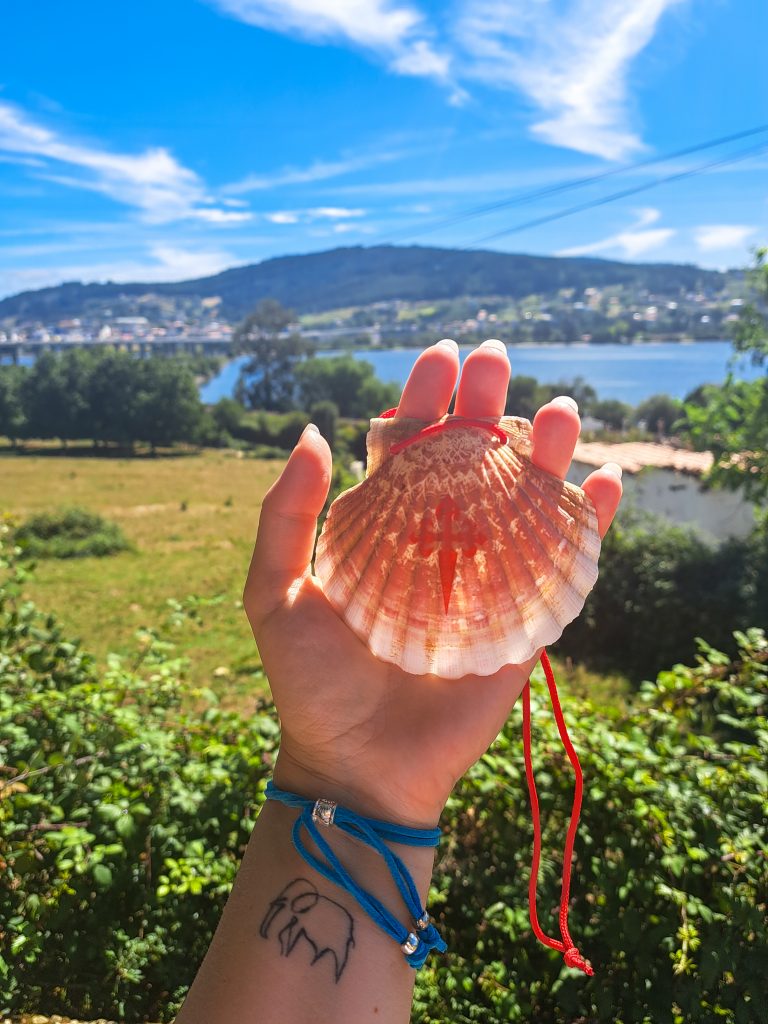
Last Reflection on Xacobeando Project
What was this project about for me? What did I learn?
¿De qué se trataba este proyecto para mí? ¿Qué aprendí?
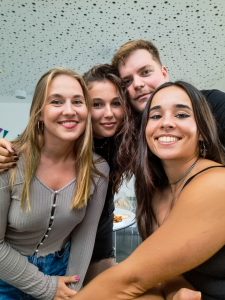 Connections. Every person that participates in ERASMUS+ or ESC projects can tell the same – it is easier to make friendship here. You instantly recognize a person from your tribe – you find each other in a big group – and hopefully a friendship for life is born. Doesn’t matter if you spend together one week or 2 months (as in our case), you bond through the same challenges, common experiences and sometimes even similar goals. If you are lucky enough, you will also have conflicts… and then your connection becomes even stronger. Why? Because it means the friendship is real – you can overcome your differences and accept each other the way that you are. I am fortunate – managed to find people who I can call FRIENDS. I can be vulnerable, stupid, funny and serious with them. We can dance in a techno party, watch a musical on Friday night, travel and just be in silence together – everything feels real. I am grateful!
Connections. Every person that participates in ERASMUS+ or ESC projects can tell the same – it is easier to make friendship here. You instantly recognize a person from your tribe – you find each other in a big group – and hopefully a friendship for life is born. Doesn’t matter if you spend together one week or 2 months (as in our case), you bond through the same challenges, common experiences and sometimes even similar goals. If you are lucky enough, you will also have conflicts… and then your connection becomes even stronger. Why? Because it means the friendship is real – you can overcome your differences and accept each other the way that you are. I am fortunate – managed to find people who I can call FRIENDS. I can be vulnerable, stupid, funny and serious with them. We can dance in a techno party, watch a musical on Friday night, travel and just be in silence together – everything feels real. I am grateful!
Conexiones. Todas las personas que participan en proyectos ERASMUS+ o CES pueden decir lo mismo: aquí es más fácil hacer amistad. Instantáneamente reconoces a una persona de tu tribu, te encuentras en un gran grupo y, con suerte, nace una amistad para toda la vida. No importa si pasan juntos una semana o dos meses (como en nuestro caso), se unen a través de los mismos desafíos, experiencias comunes y, a veces, incluso objetivos similares. Si tienes la suerte, también tendrás conflictos… y entonces tu conexión se vuelve aún más fuerte. ¿Por qué? Porque significa que la amistad es real: pueden superar sus diferencias y aceptarse mutuamente como son. Soy afortunado: logré encontrar personas a las que puedo llamar AMIGOS. Puedo ser vulnerable, estúpido, divertido y serio con ellos. Podemos bailar en una fiesta tecno, ver un musical el viernes por la noche, viajar y simplemente estar juntos en silencio: todo se siente real. ¡Estoy agradecido!
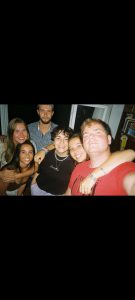 Open-mindedness. What a concept! If you would read motivational letters of the applicants for the ESC projects, 95% of them will have this magical word. But what does it mean in reality, in a mundane everyday life when you share living & working space with people from diverse cultural, social, educational backgrounds? I learnt it the hard way – being tolerant person is not limited to not saying sth openly racist or homophobic. It is also about how you react to your flatmate’s way of doing laundry, cooking style, or your colleague’s fashion sense and speaking manner. Are you easily irritated by someone’s music style which you have to hear everyday? Can you accept that another person is always late and not to see it as a personal insult? These situations really test you – your own cultural habits, character and the level of OPEN-MINDENESS. I believe, the first steps to actually be more open-minded are to accept that some things can actually get on your nerves and reflect WHY is it so. Can I communicate openly and without anger when my boundaries are overstepped? Can we be friends if we strongly disagree on something? Can I maintain my habits & engage in the local culture at the sime time? These are one of the questions I reflected on during the project.
Open-mindedness. What a concept! If you would read motivational letters of the applicants for the ESC projects, 95% of them will have this magical word. But what does it mean in reality, in a mundane everyday life when you share living & working space with people from diverse cultural, social, educational backgrounds? I learnt it the hard way – being tolerant person is not limited to not saying sth openly racist or homophobic. It is also about how you react to your flatmate’s way of doing laundry, cooking style, or your colleague’s fashion sense and speaking manner. Are you easily irritated by someone’s music style which you have to hear everyday? Can you accept that another person is always late and not to see it as a personal insult? These situations really test you – your own cultural habits, character and the level of OPEN-MINDENESS. I believe, the first steps to actually be more open-minded are to accept that some things can actually get on your nerves and reflect WHY is it so. Can I communicate openly and without anger when my boundaries are overstepped? Can we be friends if we strongly disagree on something? Can I maintain my habits & engage in the local culture at the sime time? These are one of the questions I reflected on during the project.
Mente abierta. ¡Qué concepto! Si leyeras las cartas de motivación de los candidatos a los proyectos CES, el 95% de ellos tendrán esta palabra mágica. Pero, ¿qué significa en realidad, en una vida cotidiana mundana, cuando compartes un espacio de vida y trabajo con personas de diversos orígenes culturales, sociales y educativos? Lo aprendí de la manera más difícil: ser una persona tolerante no se limita a no decir algo abiertamente racista u homofóbico. También se trata de cómo reaccionas ante la forma de lavar la ropa, el estilo de cocina de tu compañero de piso o el sentido de la moda y la manera de hablar de tu colega. ¿Te irrita fácilmente el estilo musical de alguien que tienes que escuchar todos los días? ¿Puedes aceptar que otra persona siempre llega tarde y no verlo como un insulto personal? Estas situaciones realmente te ponen a prueba: tus propios hábitos culturales, carácter y el nivel de MENTALIDAD ABIERTA. Creo que los primeros pasos para tener una mente más abierta son aceptar que algunas cosas pueden ponerte nervioso y reflexionar POR QUÉ es así. ¿Puedo comunicarme abiertamente y sin enfado cuando se traspasan mis límites? ¿Podemos ser amigos si estamos muy en desacuerdo en algo? ¿Puedo mantener mis hábitos y participar en la cultura local al mismo tiempo? Estas son una de las preguntas sobre las que reflexioné durante el proyecto.
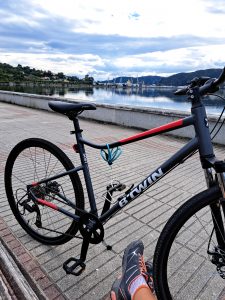 SOLO time. Paradoxically, in this TEAM project I had a lot of time for myself. Riding a bike, going on a beach, taking a walk, having cafe con leche in a local bar – I have enjoyed myself and did not feel lonely for a second. On the other hand, I must admit that my expectation for this team volunteering was to have a sense of community. Unfortunatelly, it didn’t happen. We had a lot of group activities but most of the time there were 3 of us (for one reason or another) which didn’t actually feel like a community (also, doing retakes in trio is not very motivating:)). I wish we would unite Neda’s and Ferrol’s powers from the beginning, which would have created a better sense of team (I suppose). At least it did when we were preparing for the EXHIBITION. And that leads me to my favourite activity in this project – preparing for ‘As estacións do nos Camiño’. I loved that each of us had an opportunity to use our hobbies, express our talents & just be creative. Thankful for this experience and Male’s support during it.
SOLO time. Paradoxically, in this TEAM project I had a lot of time for myself. Riding a bike, going on a beach, taking a walk, having cafe con leche in a local bar – I have enjoyed myself and did not feel lonely for a second. On the other hand, I must admit that my expectation for this team volunteering was to have a sense of community. Unfortunatelly, it didn’t happen. We had a lot of group activities but most of the time there were 3 of us (for one reason or another) which didn’t actually feel like a community (also, doing retakes in trio is not very motivating:)). I wish we would unite Neda’s and Ferrol’s powers from the beginning, which would have created a better sense of team (I suppose). At least it did when we were preparing for the EXHIBITION. And that leads me to my favourite activity in this project – preparing for ‘As estacións do nos Camiño’. I loved that each of us had an opportunity to use our hobbies, express our talents & just be creative. Thankful for this experience and Male’s support during it.
Tiempo SOLO. Paradójicamente, en este proyecto de EQUIPO tuve mucho tiempo para mí. Andar en bicicleta, ir a la playa, dar un paseo, tomar un café con leche en un bar local: me he divertido y no me he sentido solo ni por un segundo. Por otro lado, debo admitir que mi expectativa para el voluntariado de este equipo era tener un sentido de comunidad. Desafortunadamente, no sucedió. Tuvimos muchas actividades grupales, pero la mayoría de las veces éramos 3 (por una u otra razón) que en realidad no se sentían como una comunidad (además, hacer repeticiones en trío no es muy motivador :)). Ojalá hubiéramos unido los poderes de Neda y Ferrol desde el principio, lo que habría creado un mejor sentido de equipo (supongo). Al menos lo hizo cuando nos preparábamos para la EXPOSICIÓN. Y eso me lleva a mi actividad favorita en este proyecto: prepararme para ‘As estaciones do nos Camiño’. Me encantó que cada uno de nosotros tuviéramos la oportunidad de usar nuestros pasatiempos, expresar nuestros talentos y simplemente ser creativos. Agradecido por esta experiencia y el apoyo de Male durante la misma.
Exhibition ‘The Stages of our Camino’ – the event, organized by us – ESC volunteers – and Xeración in the Civic centre of Canido, Ferrol. It was a creative project, in which we presented our experiences. The volunteers painted, gathered dark stories of Galicia, made creative photo collages & more. My part consisted of photography, storytelling & poetry. I interviewed pilgrims in the hostel of Neda and made portraits of them. In addition, I wrote a metapoem for the Camino. As for many people the Camino de Santiago is a metaphor for life, I thought that poetry should be on the creative process itself. It may be not a masterpiece but it is MY way of expression & I am happy to have received a positive feedback on it. You can find the poem below. The overall mood of this event was joyful, as we would have reached the last stage of the Camino, and now willing to share OUR stories. Thank you to each of the volunteer, you have taught me so much (without even knowing:)). P.S. this post is a reflection and naturally, a thank-you letter, thus if you will read it, Fran – I am grateful for your presence, chill attitude, support & all the retakes we made. 😀 Hasta luego!
Exposición ‘Las Etapas de nuestro Camino’ – el evento, organizado por nosotros – voluntarios CES – y Xeracion en el Centro Cívico de Canido, Ferrol. Fue un proyecto creativo, en el que presentamos nuestras experiencias. Los voluntarios pintamos, recopilamos historias oscuras de Galicia, hicimos creativos collages de fotos y más. Mi parte consistió en fotografía, narración de cuentos y poesía. Entrevisté a peregrinos en el albergue de Neda y les hice retratos. Además, escribí un metapoema para el Camino. Como para mucha gente el Camino de Santiago es una metáfora de la vida, pensé que la poesía debía estar en el propio proceso creativo. Puede que no sea una obra maestra, pero es MI forma de expresión y estoy feliz de haber recibido una respuesta positiva al respecto. Puedes encontrar el poema en inglés a continuación. El estado de ánimo general de este evento fue alegre, ya que habríamos llegado a la última etapa del Camino y ahora estamos dispuestos a compartir NUESTRAS historias. Gracias a cada uno de los voluntarios, me habéis enseñado tanto (sin saberlo :)). PD Esta publicación es una reflexión y, naturalmente, una carta de agradecimiento, por lo tanto, si la lees, Fran, estoy agradecido por tu presencia, actitud relajada, apoyo y todas las repeticiones que hicimos. ¡Hasta luego!
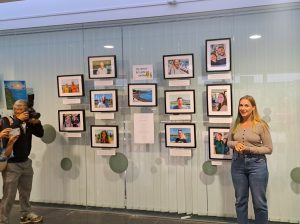
I
Maybe I should write a poem for you
Hoping that Galician sirens could be my muse
Walking the way initially to beat heavy blues
Yet I may ask the Universe for better clues.
When the world seems to be spinning out of control,
Walking restores one’s inner peace.
Every pilgrim agrees: Camino leaves you at ease.
Your knees may struggle, your feet may ache
But the soul is free as ever
It finally takes a break.
II
I will invite you to take a rock
while you will think and you will walk.
Hold it tight, then let it go.
Leave it on a milestone and carry on.
III
You’ve been dreaming of Camino
But which one – English, French or Primitivo?
One is for meeting new friends, another – the God and the latter
will offer you cliff and a mirror –
your task is to look and reconsider.
IV
You went on the way
In search of the answers
In attempt to find the light
Instead you found yourself.
You are the answer &
You are the light, my friend.
- Voluntario/a
- Camino Inglés


